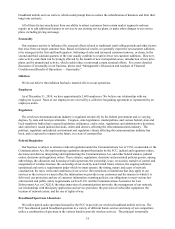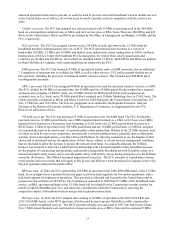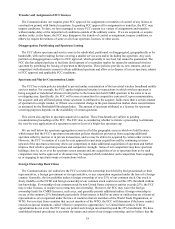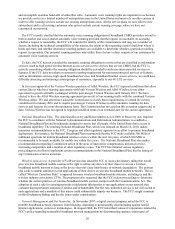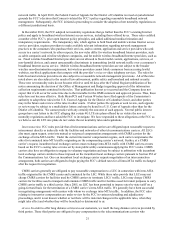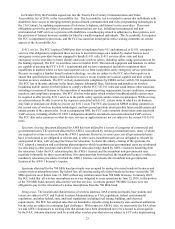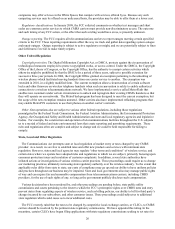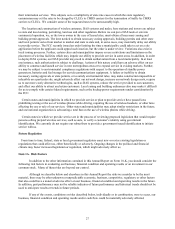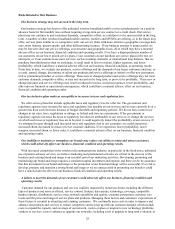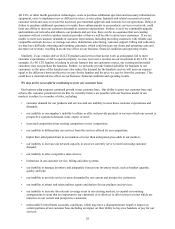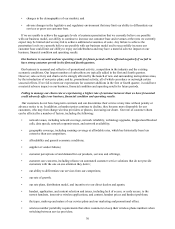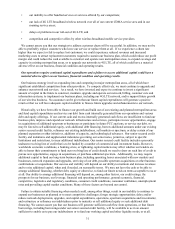Metro PCS 2010 Annual Report Download - page 31
Download and view the complete annual report
Please find page 31 of the 2010 Metro PCS annual report below. You can navigate through the pages in the report by either clicking on the pages listed below, or by using the keyword search tool below to find specific information within the annual report. 21
network traffic. In April 2010, the Federal Court of Appeals for the District of Columbia reversed on jurisdictional
grounds the FCC’s decision that Comcast violated the FCC’s policy regarding reasonable broadband network
management. Subsequently, the FCC initiated a proceeding to consider the adoption of net neutrality regulations on
a different jurisdictional basis.
In December 2010, the FCC adopted net neutrality regulations that go further than the FCC’s existing Internet
policy and apply to broadband wireless Internet access services, including those offered by us. These rules codified
a number of the FCC’s prior open Internet policy principles, and added additional nondiscrimination and
transparency requirements. The transparency rule, which applies to both fixed and mobile wireless Internet access
service providers, requires providers to make available relevant information regarding network management
practices to the consumers who purchase their services, and to content, application and service providers who seek
access to a carrier’s network. In other respects, the new rules differ for wireline broadband Internet providers, such
as cable companies and wireline telephone companies, and for mobile wireless broadband Internet providers, such as
us. Fixed wireline broadband Internet providers are not allowed to block lawful content, applications, services, or
non-harmful devices, and cannot unreasonably discriminate in transmitting lawful network traffic over a consumer’s
broadband Internet access service. Mobile wireless broadband Internet providers are not subject to the broader
wireline non-discrimination requirement, but wireless providers cannot block consumers from accessing lawful
websites, nor block applications that compete with the provider’s voice or video telephony services. The rules for
both fixed and wireless providers are also subject to a reasonable network management provisions. All of the rules
noted above are also subject to the needs of law enforcement, public safety and homeland and national security.
These new net neutrality rules do not become effective until 60 days after the Federal Register publication of the
notice announcing the decision of the Office of Management and Budget regarding approval of the information
collection requirements contained in the rules. That publication has not yet occurred and the Company does not
expect that it will occur for some time due to the timetable for the OMB comment and approval process. Thus, these
rules have not become effective. Both MetroPCS and Verizon Wireless have filed appeals of the Commission’s
authority to adopt these rules in the U.S. Court of Appeals for the District of Columbia Circuit, and other parties
may in the future seek review of the rules in other courts. If other parties file appeals or seek review, such appeals
or review may be subject to a multidistrict lottery and may be heard in a U.S. Court of Appeals other than for the
District of Columbia. We cannot predict with any certainly the outcome of such appeals. Several public interest
groups have sent letters to the FCC alleging that certain 4G LTE rate plans offered by us violate the new net
neutrality regulations and have asked the FCC to investigate. We have responded to these allegations at the FCC as
we believe our 4G LTE rate plans do not violate the net neutrality rules and regulations.
Interconnection. FCC rules provide that all telecommunications carriers are obligated upon reasonable request to
interconnect directly or indirectly with the facilities and networks of other telecommunications carriers. All LECs
also must, upon request, enter into mutual or reciprocal compensation arrangements with CMRS carriers for the
exchange of intra-MTA traffic. Under the current intercarrier compensation regime, each carrier compensates the
other for terminated intra-MTA traffic originating on the compensating carrier’s network. Further, at a CMRS
carrier’s request, incumbent local exchange carriers must exchange intra-MTA traffic with CMRS carriers at rates
based on the FCC’s costing rules or rates set by state public utility commissions applying the FCC’s rules. CMRS
carriers also have an obligation to engage in voluntary negotiation and may be subject to arbitration with incumbent
local exchange carriers similar to those imposed on the incumbent local exchange carriers pursuant to Section 252 of
the Communications Act. Once an incumbent local exchange carrier requests negotiation of an interconnection
arrangement, both carriers are obligated to begin paying the FCC’s default rates for all intra-MTA traffic exchanged
after the request for negotiation.
CMRS carriers generally are obligated to pay reasonable compensation to a LEC in connection with intra-MTA
traffic originated by the CMRS carrier and terminated by the LEC. While these rules provide that LECs may not
charge CMRS carriers for facilities used by CMRS carriers to terminate LECs’ traffic, LECs may charge CMRS
carriers for facilities used to transport and terminate CMRS traffic and for facilities used for transit purposes to carry
CMRS carrier traffic to a third carrier. Since 2005, no LEC has been permitted to impose rates by state tariff on a
going-forward basis for the termination of a CMRS carrier’s intra-MTA traffic. We generally have been successful
in negotiating arrangements with carriers with whom we exchange intra-MTA traffic. In addition, the FCC rules
relating to intercarrier compensation are under review by the FCC in various rulemaking and adjudicatory
proceedings, and it is not known whether or not there will be material changes in the applicable rules, when they
might take effect and whether they will be beneficial or detrimental to us.
Access. In order to offer long distance services to our customers, we resell the long distance services provided by
third parties. Those third parties are obligated to pay compensation to the telecommunications carriers who





